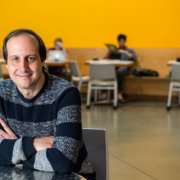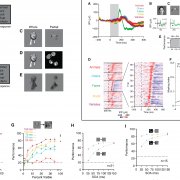September 21, 2018 - 4:00 pm
Eric Shea-Brown, University of Washington
Abstract: There is an avalanche of new data on the brain’s activity, revealing the collective dynamics of vast numbers of neurons. In principle, these collective dynamics can be of almost arbitrarily high dimension, with many independent degrees of freedom — and this may reflect...
September 21, 2018 - 11:45 am
Inaugural director of The Quest discusses what's been accomplished since last spring's launch and what is on the horizon.
It’s hard to name a field that artificial intelligence hasn’t impacted already. From mobile devices with facial recognition to self-driving cars, we are still experiencing waves of innovative technology that can be traced back to major breakthroughs in our understanding of intelligence, like machine learning. But the truth is...
September 19, 2018 - 3:00 pm
“This is the most important conversation of our time, and Tegmark’s thought-provoking book will help you join it.” As Stephen Hawking comments on the book Life 3.0: Being Human in the age of Artificial Intelligence, an AI masterpiece by MIT professor Max Tegmark, also the founder of the Future of Life Institute.
On September 19th, Professor Tegmark paid a visit to the headquarters of Cheetah Mobile, China’s second-largest internet security...
September 17, 2018 - 1:00 pm
By Kelly Servick
"PHILADELPHIA, PENNSYLVANIA—While artificial intelligence (AI) has been busy trouncing humans at Go and spawning eerily personable Alexas, some neuroscientists have harbored a different hope: that the types of algorithms driving those technologies can also yield some insight into the squishy, wet computers in our skulls. At the Conference on Cognitive Computational Neuroscience here this month, researchers presented new tools...
September 15, 2018 - 1:45 pm
by Phil Rowley
"I’ve just finished reading the book Life 3.0 by physicist & AI philosopher Max Tegmark, where he sets out a series of possible scenarios and outcomes for humankind sharing the planet with artificial intelligence.
But because you’re busy installing PowerPoint fonts or finding meeting rooms, I’m going to summarise it here. And because you’re double-busy I’m going to use a series of sci-fi films as a ‘mental...
September 15, 2018 - 1:00 pm
We have lot of AI technologies, but no real artificial intelligence. MIT's Josh Tenenbaum leads a moonshot effort to close this gap by reverse engineering how children learn.
By John Morris for Between the Lines
"The world has seen remarkable progress in artificial intelligence in recent years, but general AI remains science fiction. One of the keys to making this leap could be the human brain. In a talk at the EmTech MIT conference this week,...
September 14, 2018 - 4:00 pm
Julia Sliwa, The Rockefeller University
Our brain continuously decodes the complex visual scenes unwinding in front of us: both the nature of material entities, such as individuals and objects, and their immaterial interactions. I will briefly talk about individual recognition in monkeys and next turn to interaction processing....
September 14, 2018 - 3:00 pm
Biologically inspired computational model can efficiently and invariantly search for natural objects in complex scenes
by Kris Brewer
Since 1987, people have been searching for the elusive red and white adorned “Waldo” in the visually crafted books of Martin Handford. This entertaining and challenging endeavor to find the bespectacled character illustrates a task that humans embark upon regularly in their daily routines. With a pan on the stove...
September 13, 2018 - 12:45 pm
by Nicole Laskowski Senior News Writer
Advances in AI have spurred high interest in the technology, but the road to making machines intelligent remains a long one, said MIT's Josh Tenenbaum at the EmTech conference.
CAMBRIDGE -- Current progress in machine intelligence is newsworthy, but it's often talked about out of context. MIT's Josh Tenenbaum described it this way: Advances in deep learning are powering machines to accurately recognize...
September 12, 2018 - 12:15 pm
Cognitive science and neuroscience could inspire the next big innovations in artificial intelligence, says the head of an ambitious new MIT-led research project.
by Will Knight
The next big breakthroughs in artificial intelligence may depend on exploring our own minds.
So says Josh Tenenbaum, who leads the Computational Cognitive Science lab at MIT and is the head of a major new AI project called the MIT Quest for Intelligence.
The project...
August 27, 2018 - 1:15 pm
by Leland Teschler
"YOU MIGHT THINK the way to make better engineers is to improve engineering education. Although there may be something to that idea, it is becoming apparent that factors outside the formal learning process may outweigh anything done on a campus.
For example, it increasingly looks as though the engineering mindset is a function of preschool experiences. Consider this fun fact: For every 15 minutes of play, kids tend to use a...
August 15, 2018 - 3:00 pm
Machines inspired by physiological and anatomical constraints to improve pattern completion
by Kris Brewer
When we open our eyes in the morning and take in that first scene of the day, we don’t give much thought to our surroundings and the fact that our brain is processing the objects within our field of view with such efficiency and lack of information to allow us to go about our daily functions. The glass of water you left on the nightstand...
August 6, 2018 - 10:30 am
Collaboration between MIT and Weizmann Institute of Science supports new avenues of scientific research.
Sagol family grant will enable MIT and Israel's Weizmann Institute of Science to work together on multidisciplinary projects.
MIT News | MIT Resource Development
August 2, 2018
MIT and the Weizmann Institute of Science in Israel have announced a new research collaboration, made possible by a gift from the Sagol family, that will support a...
July 24, 2018 - 4:45 pm
On Mon., July 23, 2018, the MIT School of Science announced eight faculty members to named professorship. These positions afford the faculty members additional support to pursue their research and develop their careers.
In this announcemt, CBMM Investigator Prof. Rebecca Saxe was named as the inaugural John W. Jarve (1978) Professor in Brain and Cognitive Sciences:
Rebecca Saxe, the inaugural John W. Jarve (1978) Professor in Brain and...
July 24, 2018 - 11:00 am
Dr. Joseph T. Lizier, The University of Sydney
Abstract:
The space-time dynamics of interactions in neural systems are often described using terminology of information processing, or computation, in particular with reference to information being stored, transferred and modified in these systems. In this talk, we describe an information-...
The space-time dynamics of interactions in neural systems are often described using terminology of information processing, or computation, in particular with reference to information being stored, transferred and modified in these systems. In this talk, we describe an information-...



![AI Dialogue between CEO of Cheetah Mobile and MIT professor Max Tegmark [Pandaily] AI Dialogue between CEO of Cheetah Mobile and MIT professor Max Tegmark [Pandaily]](https://cbmm.mit.edu/sites/default/files/styles/people_180x180/public/news-events/fusheng-732x380.jpg?itok=z_QElbG4)











